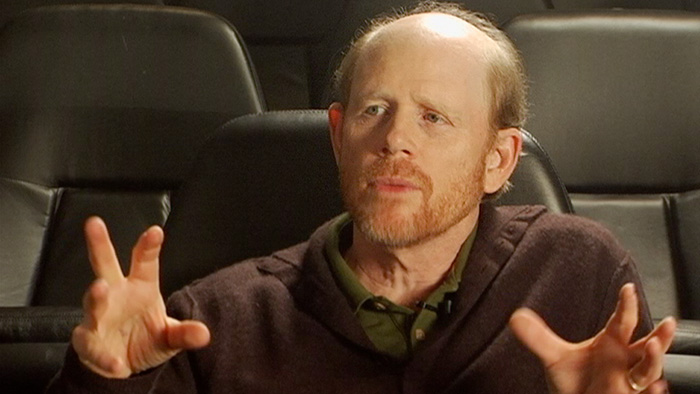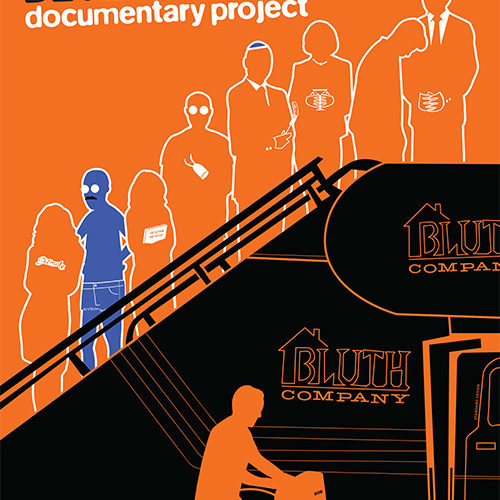Something had to suffer once the critically acclaimed and criminally under-watched television comedy Arrested Development was announced to be in production with new episodes, courtesy of Netflix. That victim is Jeff Smith’s The Arrested Development Documentary Project.
Completed in 2012 from interview footage filmed before the show’s phoenix-like rebirth (a trailer was released on the movie’s website back in 2009), what was to be a posthumous love letter is now merely a glorified DVD extra of actors and writers talking about their connection to and the genesis of the show. Whereas Done the Impossible: The Fans’ Tale of ‘Firefly’ and ‘Serenity’ spoke about Firefly’s improbable resurrection and those diehard fans who spearheaded the effort through online chatter and never-say-die attitude, Smith’s look behind the scenes has fans describing characters we already know and love. So, while this would have worked nicely as a ten-year anniversary retrospective of a dead show, it’s now rendered obsolete in lieu of wanting to learn the story surrounding its return.

Smith probably never meant to create something more than a look back in remembrance, so you can’t fault him for bad timing. Yes, it creates awareness for the show and some random people interviewed at Venice Beach ignorant to Arrested Development’s existence say they’d watch it now, but what about content a fan like me who owns the DVDs and revisits them doesn’t already know? There are legions of fans—as witnessed by the end-credits hometown list for those showcased—so why not ask them what being a fan means? What have they done to keep it alive in their hearts and minds? I don’t care who their favorite character is. I want to hear the girl wearing a homemade “shémale” shirt tell us how many people understood the joke while walking around in public.
Firefly fans are interesting enough to carry a documentary dealing with them over the show itself because they’ve created a community and a culture out of the fiction. Arrested Development fans unfortunately haven’t. They are people who loved a show and enjoy quoting it with friends despite having no real drive to actively help resuscitate it. So listening to them broadly describe iconic roles in exactly the same way you would yourself does little to earn your time. And as far as signing new fans onto the phenomenon, I’m not sure anyone who doesn’t already understand the appeal will take the time to watch this documentary anyway. Even if they do, random kids sitting in front of their fireplaces aren’t necessarily respected experts. Maybe someone would say Keith Olbermann is, however.

Smith and company understand this and end up culling together a great selection of main castmembers—minus Michael Cera and Jessica Walter—guest stars, and crew to help things along. Anecdotes concerning the fear that Jason Bateman was a TV-show pilot kiss of death or Will Arnett almost not taking the audition because he had been burned by a previous experience are where the documentary shines. Alia Shawkat pulls no punches on why she thinks the show failed (marketing), David Cross stands by his now famous rant against Fox, and directors Jay Chandrasekhar and Paul Feig aren’t afraid to admit creator/writer Mitchell Hurwitz was notoriously late with his scripts. Heck, even Hurwitz speaks about how perhaps his vision wasn’t the one necessary to keep the show alive. It did get cancelled after all.
But while it’s fun to listen to the creators—especially Hurwitz on inspiration, Ron Howard on his original idea, Anthony and Joe Russo on their guerilla shooting style, and writer James Vallely on script density—there needs to be more. We receive some conflict from a Fox Executive and his interpretation of Hurwitz’s style in the editing room to buy time re-writing the show in post, but that’s about it. Smith likely didn’t anticipate there being more to the story besides the oft-rumored movie and therefore conducted his interviews accordingly. Everyone looks back fondly, admit they’ve not received the same level of content since, and talk candidly about a couple experiences on set. Perhaps footage could have helped give better context, but again this film is more for current fans who already know rather than novices who don’t.

It could very well be my problem alone, but I had hoped to see a document on the show’s demise and what everyone believed was its cause rather than backslapping nostalgia. Give me more about Fox begrudgingly awarding them a second season after winning an Emmy, more on the actors’ frustrations of constantly having one foot in the grave, and perhaps more humorous tales about one another. Sadly, Arrested Development fans aren’t all that riveting on their own and hearing actors talk about their own characters can prove uninteresting when their performances do the job better. A fluff piece that can find a nice home on the eventual season four DVD, The Arrested Development Documentary Project possesses ample promise but simply shies away from the content I believe people are truly interested in.
The Arrested Development Documentary Project is now available on VOD.

